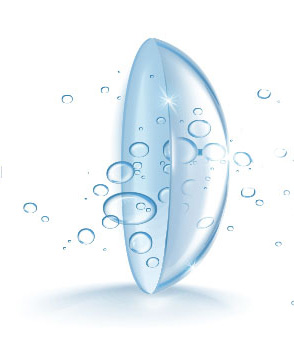Silicone hydrogel lenses and hydrogel lenses are both types of contact lenses, and they differ primarily in their material composition. Let's explore the key distinctions between the two:
- Material Composition:
- Hydrogel Lenses: These lenses are made from a soft, water-containing polymer. The water content in hydrogel lenses allows oxygen to pass through to the cornea, helping to keep the eyes hydrated.
- Silicone Hydrogel Lenses: These lenses are made from a more advanced material that combines silicone and hydrogel. The addition of silicone allows more efficient oxygen transmission to the cornea compared to traditional hydrogel lenses.
- Oxygen Permeability:
- Hydrogel Lenses: While hydrogel lenses provide good oxygen permeability, they may not be as efficient as silicone hydrogel lenses in allowing oxygen to reach the cornea. This can be a concern for some individuals, especially those who wear their lenses for extended periods.
- Silicone Hydrogel Lenses: These lenses have a higher oxygen permeability, making them more breathable. This is beneficial for maintaining eye health, especially for those who wear lenses for long hours or have a higher risk of developing eye conditions related to oxygen deprivation.
- Comfort and Moisture Retention:
- Hydrogel Lenses: The water content in hydrogel lenses can contribute to increased comfort, as the lenses are more pliable and may retain moisture better.
- Silicone Hydrogel Lenses: While silicone hydrogel lenses also maintain good moisture levels, some wearers find them slightly less comfortable than traditional hydrogel lenses due to the different material properties.
- Usage and Replacement Schedule:
- Hydrogel Lenses: These lenses are available in various replacement schedules, including daily, bi-weekly, and monthly. The choice depends on the specific type and brand.
- Silicone Hydrogel Lenses: These lenses are often recommended for extended or continuous wear due to their superior oxygen permeability. However, the specific wearing schedule can vary based on the brand and type of lens.
- Cost:
- Hydrogel Lenses: Generally, hydrogel lenses may be more budget-friendly compared to silicone hydrogel lenses.
- Silicone Hydrogel Lenses: These lenses may be slightly more expensive, but the cost can vary depending on the brand, prescription, and other factors.
When choosing between silicone hydrogel and hydrogel lenses, it's essential to consider factors such as your eye health, wearing habits, and comfort preferences. It's also advisable to consult with an eye care professional who can provide personalized recommendations based on your specific needs.